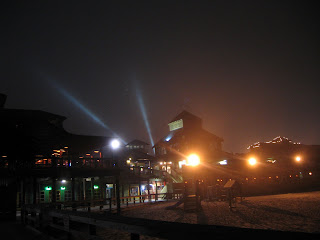 I survived Hurricane Ivan, but I didn't bother getting the t-shirt. What I did get was some good insight into what I think of as Survivor Economics.
I survived Hurricane Ivan, but I didn't bother getting the t-shirt. What I did get was some good insight into what I think of as Survivor Economics.Driving back into town I was greeted by boats on the highway and trees snapped into kindling. Power lines hung everywhere like ropey cobwebs between the buildings. Evacuees like myself rolled back into town, rubber necking and swerving around debris. Finding our house intact was cause for celebration and thankful prayers.
It wasn't before long, however, before we began wondering why we had hurried back. There was no power, no stores and no gas. Stocked cupboards look anemic when you start anticipating a month coming out of them. A full tank of gas isn't much when there's no more gas to add. Electricity is what I missed the least, except for my coffeemaker and my computer.
Some people banded together in this time of crisis - they watched each others children, shared ice and had giant cookouts with all the meat that was going to spoil otherwise. Those that had generators shared fridge space. Those with gas stoves shared cooking time. The period of difficulty turned into a time of bonding that turned some neighbors into family.
Unfortunately, crisis also brings out the worst in people. A man ran over another with his car in a gas line. Another was shot. Thieves were going into open garages in broad daylight to run off with bicycles. People were reporting that their tanks had been siphoned while they slept.
It took a week or so, but power was restored, the gas stations could accept fuel deliveries again and the grocery stores opened back up. Normal life returned, but here on the gulf coast we had had a wake up call that some took to heart while others struggled to decipher what had happened and forget. One thing we all learned: money really can't buy everything if there is nothing to buy.
A few months later I had a conversation that summed it up for me. In reminiscing about life after the hurricane a man told me how in the worst hit area there had literally been no food for a week. All the beach houses had been washed out by the storm, furnishings and edibles replaced or buried by tons of sand. He said that people wandered around with wads of money looking for food they could by. "No doubt about it," he told me. "The richest man on the island was whoever had a sandwich."
In survivor economics a dollar is just a piece of paper that doesn't even make good fire starter. Real wealth is tangible - food, shelter, water and protection. Those that could provide these things found themselves literally blown to the top of the heap by the storm until regular life as we know it returned. The rest of us soon went on with business as usual, but a little wiser and with an understanding of how little a weeks worth of food really is.
No comments:
Post a Comment